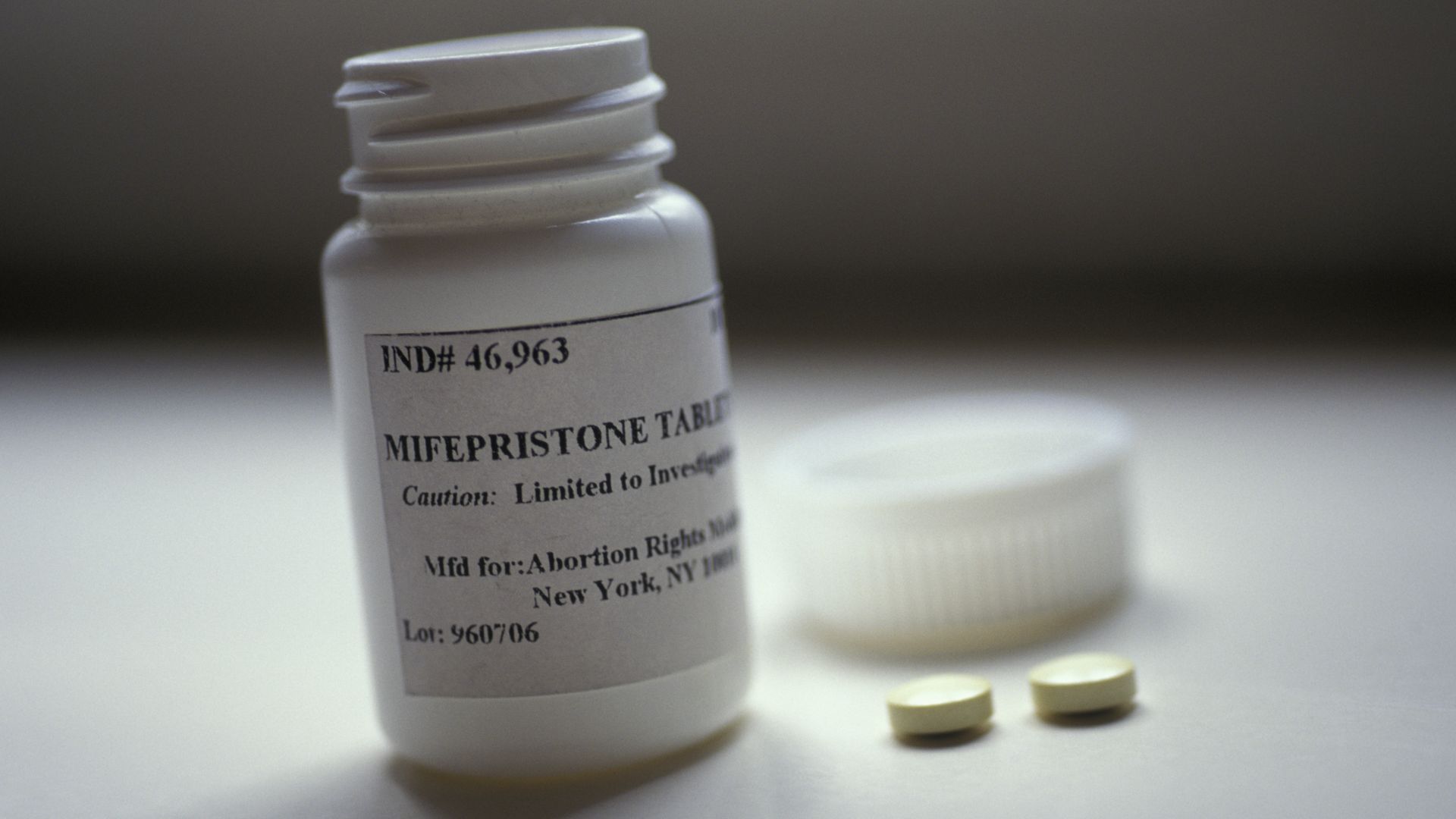
Photo: James Leynse/Corbis via Getty Images
A federal judge in Texas is poised to rule "as soon as possible" on whether to suspend the FDA's approval of a widely-used abortion pill and potentially reverse the agency's authority on drug regulation for the first time.
Why it matters: Legal experts fear that if District Judge Matthew Kacsmaryk orders the FDA to temporarily withdraw its approval of mifepristone, others will challenge FDA-approved treatments that they disagree with.
- Kacsmaryk, a Trump appointee who openly opposed Roe v. Wade, heard arguments on Wednesday from the parties involved in the case and said he would issue a ruling "as soon as possible."
- The case was brought by a coalition of anti-abortion groups challenging the FDA's 2000 approval on the grounds that the agency did not properly authorize the pill for terminating pregnancies.
State of play: A ruling "will have very significant implications for the drug approval process in this country as we know it," Lorie Chaiten, a senior staff attorney with the ACLU, told Axios last month. "It would say that a single judge sitting in Amarillo, Texas, gets to define drug approval policy and abortion policy for the entire country."
- Additionally, "[m]anufacturers may be reluctant to bring to market certain new drugs or treatments if they are concerned that a court ruling could block the approval of the drug in the future," according to the Kaiser Family Foundation.
Driving the news: Kacsmaryk asked the anti-abortion group's attorney, Erik Baptist, if he could cite any other instances in which a court has removed an FDA-approved drug from the market. Baptist said there were none.
- The judge also asked Baptist how to write a decision ordering the FDA to suspend its approval. The attorney said the court can order the FDA withdrawal “on its own accord," per The Washington Post.
Details: The FDA has a process for removing drugs from the market, so it is unclear precisely how a ruling for the plaintiffs could disrupt or supersede that process.
- When the FDA requests a drug recall, it notifies manufacturers, who then have the opportunity to request a hearing, grant the request or argue against it. The process can take up to a year.
What they're saying: "There’s no precedent or basis for the judge to simply 'undo' an approval from the bench," said Susan Lee, a partner at the law firm Goodwin who specializes in the FDA's regulation of drugs and biologics.
- "A judge’s appropriate role can be to consider whether the FDA appropriately exercised its legal authorities and followed its own regulations when making decisions, but it would be concerning if Judge Kacsmaryk were to come to a decision suggesting that his ruling can supersede the authorities that have been granted to FDA by law."
- "This type of activity would fundamentally de-stabilize the FDA regulatory system," Lee added.
What we're watching: "It is the federal government's practice to follow a court order in these circumstances," said David Donatti, an attorney with the ACLU of Texas.
- However, Donatti said, he expects that if the FDA gets any "adverse order," the agency would seek an emergency order from an appeals court.
- "I think that there would be a good argument for that, which is that this is a drug that is distributed nationwide … with a sterling safety rating that is relied upon by millions of people for their health care," Donatti added.
- Any decision from this case would likely be appealed to the 5th U.S. Circuit Court of Appeals, widely regarded as one of the most conservative appeallate courts, and could eventually reach the Supreme Court.
Zoom in: The hearing today focused on looking at mifepristone's initial 2000 approval that the FDA granted under rules known as "Subpart H," which were used at the time to expedite approval or drugs that treated "serious or life-threatening illnesses," such as HIV/AIDS.
- The plaintiffs in the Texas case argue that the FDA violated its own rules when it approved mifepristone because pregnancy, they say, it not a disease. However, some health experts say that this argument lacks standing because mifepristone is now approved under an agency process for drugs with safety concerns.
- "The issue is kind of moot," said Alina Salganicoff, KFF's senior vice president and director of women’s health policy. "REMS basically replaced Subpart H."
Don't forget: There is another lawsuit brought by state Democratic attorneys general challenging the FDA's REMS restrictions on mifepristone in an effort to make the drug more easily accessible.
- Two other lawsuits have been brought in North Carolina and West Virginia that are looking to answer the question on whether states can regulate or restrict FDA-approved drugs.
- Kacsmaryk's ruling could impact the outcome of these other lawsuits.
Go deeper: How abortion pills work and why they're in the spotlight
Source: Read Full Article
